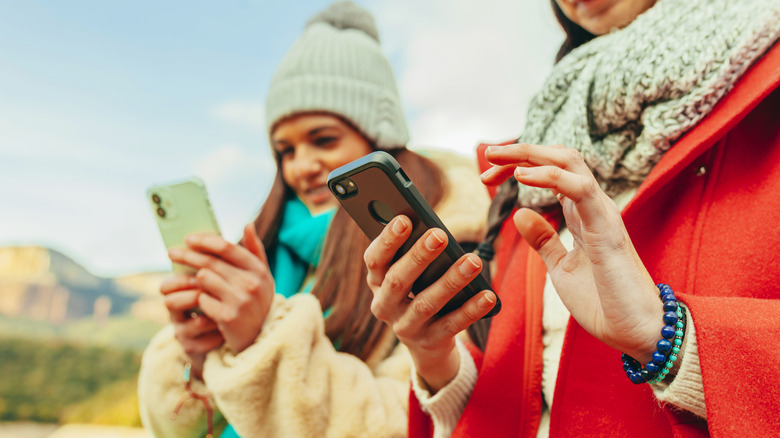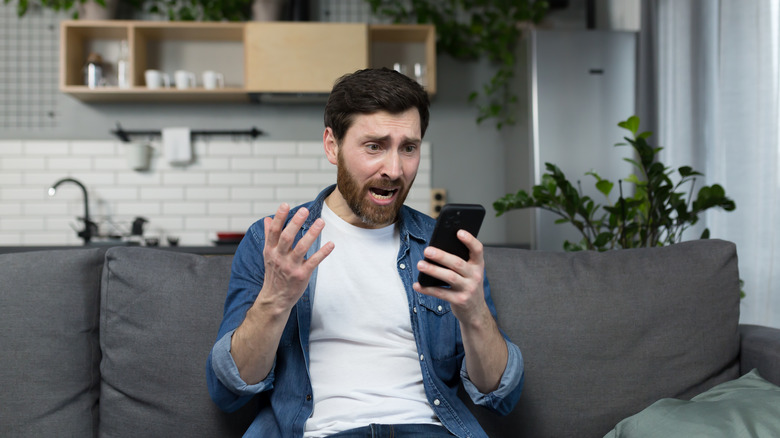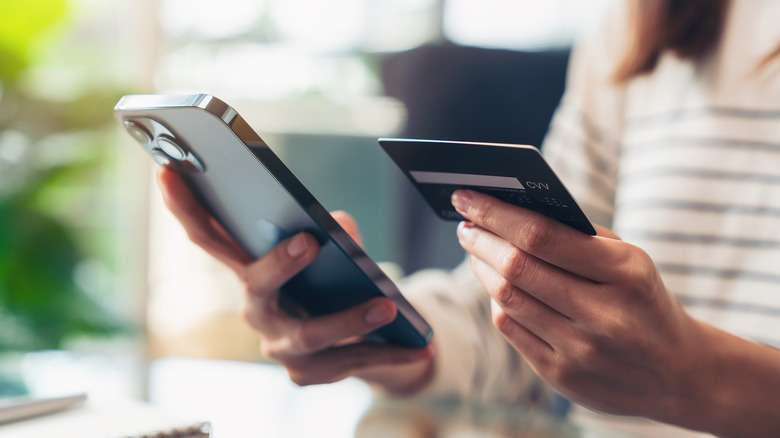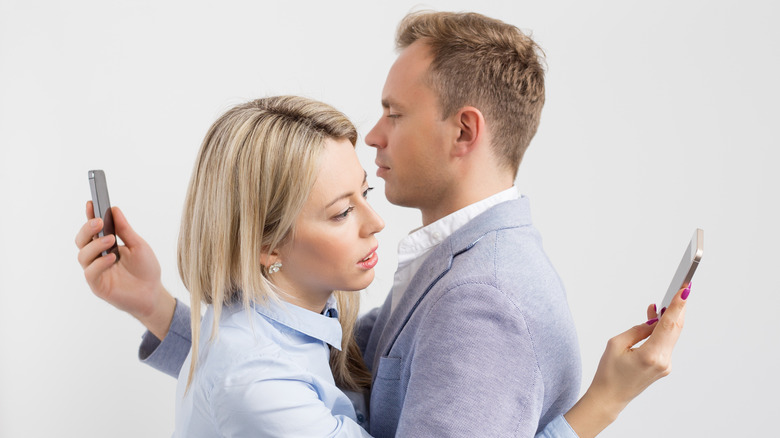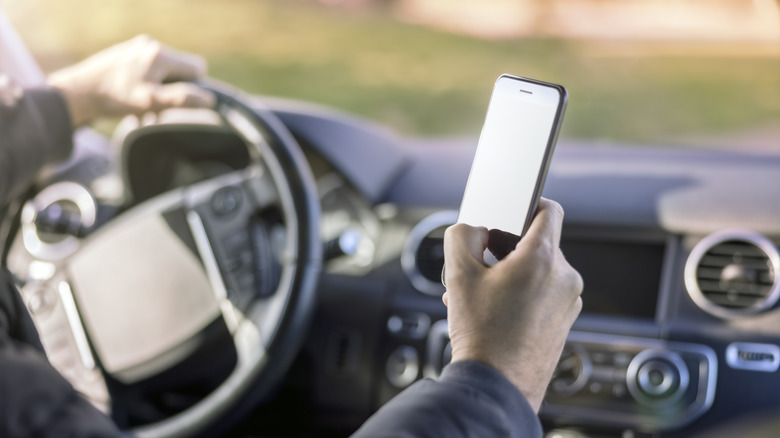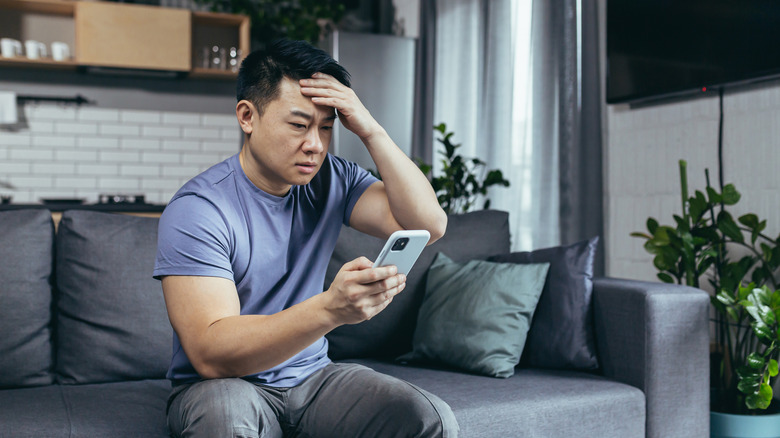The Most Hilarious Things iPhone Users Have In Common
If you spent some time polling people on the streets of America, you'd soon arrive at the conclusion that iPhones are almost ubiquitous. Indeed, as reported by Financial Times, more U.S. smartphone users now own an iPhone than a device running Android. And when you account for the fact that iPhones are manufactured by a single company, Apple, whereas Android phones are made by a variety of brands, from Samsung and Google to smaller outfits like Nothing, the iPhone does indeed appear dominant on the national market.
You'll also find iPhone users have plenty of things in common aside from always asking if you have a Lightning cable to charge their phone. They tend to share plenty of eyebrow-raising and sometimes hilarious traits compared to their Android peers. From driving habits to education levels, and even features of their personality, the shared attributes of many iOS users are fascinating data. Here are the most hilarious things iPhone users have in common.
iPhone users won't text with Android users
iPhone owners are often accused of being an exclusive — and perhaps snobbish — bunch. Few notions have added fuel to that perception like the way Android users are sometimes treated in text messages and group chats. The dreaded "green bubble" that appears in iMessage when an Android user slides into the DMs has turned a lot of iPhone users off to the notion of communicating with their Samsung or Pixel-toting friends. But as petty as the whole thing may seem, it's not entirely the fault of Apple's customers.
In 2020, Epic Games, the video game developer responsible for "Fortnite," launched a lawsuit against Apple, and in the process, the secrets of the green bubble were revealed. While the lawsuit revolved around the 30% cut Apple takes on in-app purchases from apps installed through the App Store, court filings ended up revealing some of the Cupertino giant's other business practices, including its rationale for keeping iMessage an Apple exclusive.
As reported by SlashGear, Epic alleged that Apple engages in anticompetitive practices, and, as proof, cited comments made by Apple executives. Craig Federighi, Eddy Cue, and other higher-ups noted in internal emails that making iMessage work on Android wouldn't be difficult, but that it would "remove [an] obstacle to iPhone families giving their kids Android phones" and that "iPhone amounts to serious lock-in" for Apple's walled garden ecosystem.
In other words, if an iPhone user disses you for your green bubbles, it might be a good idea to explain that Apple is intentionally degrading its messaging experience to keep iPhone users in the fold. For now, Google is working to make things more equal.
iPhone users tend to be less humble and more emotional
While many of the trends among iPhone users are the result of independent data analysis, one particularly hilarious commonality among them has been peer-reviewed. According to a personality study from 2016, researchers were able to predict with a high degree of accuracy which smartphone operating system people used based on their personality traits. iPhone users scored lower levels on Honesty-Humility metrics and displayed higher levels of emotionality. iPhones were also more likely to be owned by those concerned about their smartphone being viewed by others as a status symbol. Surprisingly, gender proved to be the most predictive factor, with women twice as likely to own an iPhone.
Indeed, without knowing which phone someone owned, the researchers found they were able to use predictive modeling to determine with 69% more accuracy than random chance alone whether it would be running iOS or Android by analyzing these traits among participants. While the study concluded that further research is needed to determine why, precisely, smartphone users sort into these traits, researchers remained confident in the connections they identified.
If Android users were the type to flex on iPhone users — which they apparently aren't — they have the science to back up their good nature.
iPhone users spend more money than Android users
Apple loves to market its products as luxury items and has developed a reputation for appearing to pretend the competition doesn't even exist. The company has charged nearly a thousand bucks for a display stand, and the iPhone X was the phone that cemented thousand-dollar flagships as commonplace. So perhaps its no surprise that iPhone users tend to spend more money than Android users. A lot more, in fact.
According to data from a 2018 survey obtained by SlashGear, iPhone users spent an average of $117.13 per month on clothes, $100.88 on tech, and $82.71 on makeup and beauty products. Comparatively, Android users spent $62.36, $50.83, and $40.40 on those product categories, respectively. A quick glance at those numbers will tell you iPhone users outspend Android users by a wide margin. In addition, the survey found that iPhone users think an ideal weekend means going out with friends, whereas Android owners would rather stay in with a good book, so maybe all that extra spending on clothes and makeup is going toward looking their best on the dancefloor.
Does that mean iPhone users are throwing out cash willy-nilly? Perhaps in some instances. But the more likely explanation is simple: they make more money.
iPhones users make more money than Android users
While it may seem like iPhone users are living in relative opulence compared to their Android-wielding counterparts, that's not necessarily the full story. That same survey identifying the higher spending trends also identified another similarity among iPhone users in the United States. They tend to make more money than Android users.
The average salary of iPhone users polled was $53,251, while that of Android users was $37,040. Meanwhile, according to a different report by data analytics firm Comscore, that figure is even higher, with the median income for iPhone app users ringing up at $85,000 and Android app users having a median income of $61,000 in its findings. In other words, while iPhone users might have a little more cash to blow on clothes, tech, and beauty products, Android users have a tighter belt. Considering that the vast majority of budget phones are Androids, it makes a good deal of sense. While there are certainly well-off Android users — Samsung's Z-Fold line of foldable phones makes iPhones look downright affordable — most people looking for a cheap phone are bound to wind up with an Android of some sort.
As for why iPhone buyers make more money, there's a possible explanation for that, too. The simple fact is that they tend to be more educated.
iPhone users are more likely to have a graduate degree
According to data from venture capitalist Todd Hixon published in Forbes which used survey responses from 27 million people, iPhone users present another commonality. His data find that iPhone users have a proclivity toward higher education, with weighted metrics showing that iPhone people are 27% more likely to have a graduate degree or Ph.D. compared to the average person and 33% less likely to have only earned a high school diploma. Meanwhile, Android folks are weighted 8 points in favor of multiple degrees while being 12% less likely than the median to have a high school education alone.
This would at least partially explain the tendency for iPhone users to have higher incomes, as jobs requiring advanced degrees tend to pay more. Hixon further found that iPhone users are far more likely to work in professional or managerial jobs, while Android devotees tend toward the fields of computing, technology, and medicine.
iPhone users are more addicted to their phones
People these days are so addicted to their phones, right? We've all heard those gripes at one point or another, usually in the form of someone waxing moralistic about how no one can just "enjoy the moment" anymore. Well, if you're an Android user, tell those people to blame the iPhone owners. Another tidbit found in Todd Hixon's report for Forbes is that iPhone users are 67% more likely than the average person to describe themselves as "addicted" to their phones, while Android users weigh only 39 points above the norm.
A more charitable read of this statistic might be that iPhones are just more optimized and therefore easier to spend time on. Instagram, for example, runs fluidly on iPhones in a way that it simply doesn't on many Android devices, and a lot of midrange or budget Androids can have frustrating performance issues that may drive people away from spending time on them. Additionally, since they tend to be in professional or managerial jobs, maybe they're tied more to their phones for work. But given some of the commonalities we've listed among iPhone users, such as their tendency to be vainer and more concerned with status, there's also the possibility that they tend to be more hooked in by the self-reflective nature of social media or are incentivized by Apple's own ecosystem to use their phones more consistently.
iPhone users are worse drivers
The next time you take a ride from someone, it might be a good idea to check whether they own an iPhone before you hop in the passenger seat. That's according to car insurance broker Jerry, which, in an internal study, found that Android users outscored their iPhone peers across a range of safe driving metrics. From speeding to distracted driving to braking, accelerating, or turning, iPhone users scored worse, with the overall scores for both groups coming in at 75 points for Android owners and 69 points for iPhone holders. The gap was especially wide for distracted driving, with Android-equipped drivers coming in 6 points ahead. Additionally, these scores held true across all education levels—from those without a high school diploma to Ph.D. recipients.
While it would be prudent to conduct follow-up studies before equating correlation with causation, especially given the imprecise nature of the presentation of the results, there are some possible explanations for these findings scattered across the other iPhone user trends on this list. The tendency to be more humble and honest could indicate that Android users are less likely to break rules, including those of the road. And since iPhone users are more addicted to their phones, it's possible that habit extends behind the wheel, which would correlate with the large gap in distracted driving scores found in these data.
In any case, it's a good thing Apple added crash detection to the latest iPhones. It seems their customers may need it more than the Google Pixel users who had something similar, first.
iPhone users are less tech-savvy
This one may not apply to readers of SlashGear, but in general, iPhone users are less likely to be aware of what's going on in the tech world. This stat comes once again from Todd Hixon's data in Forbes, where he finds that iPhone people weighted 13 points less likely than Android people to follow tech news.
There's a simple explanation for this trend. Under Steve Jobs, Apple developed the famous slogan, "It just works." Other marketing tags from the Cupertino computer company have included, "Practically magic," and, "Automatic and effortless." In other words, Apple recognizes that a major selling point for their devices is that you don't have to be a tech-oriented person to use them.
Apple's approach to customer service reflects this, as well. Until 2022, when the company launched its self-service repair program, you couldn't repair your own Apple products and expect them to remain under warranty. You had to bring them to a Genius Bar or another authorized vendor. Power users found this approach condescending, especially when Apple aggressively fought "right to repair" laws and maintained that their authorized service channel personnel were necessary to make sure "repairs are performed safely, securely, and to the highest quality."
